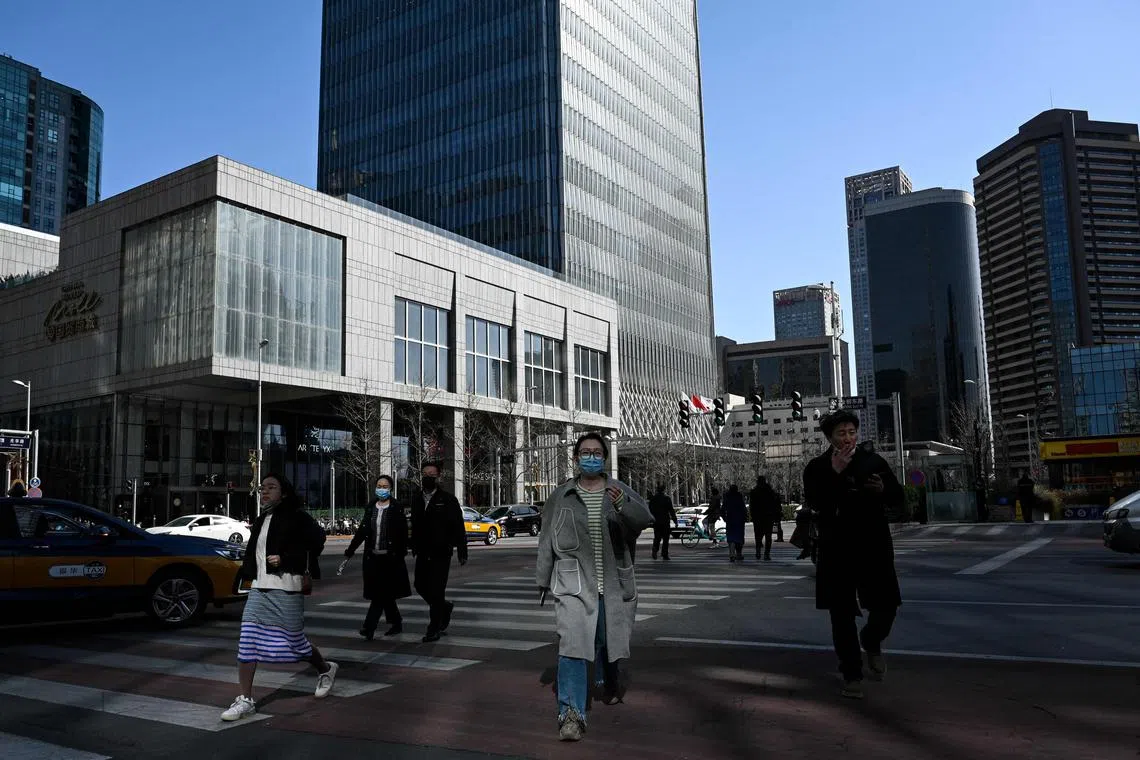China sets modest GDP growth target of around 5% for 2023; defence spending to rise
Sign up now: Get insights on Asia's fast-moving developments

The Chinese economy is expected to contribute a third of global growth this year, said the IMF.
PHOTO: AFP
BEIJING - China has set its sights on expanding the economy by about 5 per cent in 2023, a more modest goal after it missed its 5.5 per cent target last year.
Defence spending will grow by 7.2 per cent to to 1.55 trillion yuan (S$302 billion)
The headline figure for China’s gross domestic product, announced by Premier Li Keqiang at the opening session of the country’s legislature on Sunday, was in line with external projections.
On Friday, the International Monetary Fund revised upwards China’s 2023 growth outlook to 5.2 per cent. The Chinese economy is now expected to contribute a third of global growth this year, it said.
Economic recovery has been high on Beijing’s agenda as the world’s second-largest economy emerges from the pandemic while facing growing challenges from its rivalry with the United States, widening income and wealth gaps, and a rapidly ageing population exacerbated by low fertility rates.
In 2022, China’s GDP grew by just 3 per cent,
Mr Li was delivering the annual work report - his 10th and last as premier.
It said that the government this year will aim to create 12 million jobs in urban areas this year, up from the 11 million target it set last year, as the number of graduates is expected to hit a record high of 11.58 million in 2023.
It will try to maintain unemployment in urban areas at 5.5 per cent this year, just as it did for last year.
In setting out the key priorities for the government this year, Mr Li listed first the need to stimulate domestic demand. Consumption has been the main driver of growth in China, but had suffered because of the pandemic and the country’s stringent zero-Covid policy.
It will also focus on achieving breakthroughs in core technologies, improve logistics systems and supply chains and speed up development of the digital economy, said Mr Li.
On the back of more optimistic economic growth, China is setting its 2023 budget deficit target at 3 per cent of the GDP, higher than last year’s 2.8 per cent. The ratio indicates a country’s ability to pay back its debts.
On defence spending, Mr Li said the armed forces should work to “carry out military operations, boost combat preparedness, and enhance military capabilities so as to accomplish the tasks entrusted to them by the party and people”.
This is with an eye to achieving the goals for the centenary of the People’s Liberation Army (PLA) in 2027, the report stated.
China’s defence budget is closely watched as a barometer of how Beijing will expand its military capabilities.
After three years of Covid-19 disruptions, the National People’s Congress (NPC) and political advisory body Chinese People’s Political Consultative Conference (CPPCC) are meeting in full, with some 5,000 delegates descending on Beijing
Collectively known as the Two Sessions or lianghui, this is the first such meeting after last October’s 20th Party Congress, where President Xi Jinping secured a rare third five-year term as head of the Communist Party of China (CPC) and chairman of the Central Military Commission.
The NPC is expected to formally endorse Mr Xi for a third term as State President during the meetings.
After 2022’s lacklustre economic performance beset by Covid-linked lockdowns and disruptions, China faces an uphill task in stimulating the economy amid sluggish consumer demand, a battered property market and weak investor confidence.
Worsening relations with the US
Also on the cards are “wide-ranging” and “intensive” reorganisation of state and CPC entities, which would give the Party greater control over state institutions.
This comes after Mr Xi stacked the Politburo Standing Committee – China’s apex decision-making body – with allies loyal to him.
Former Shanghai party chief Li Qiang, who oversaw a challenging two-month lockdown of the financial hub in 2022 and is now ranked second in party hierarchy, is all but certain to succeed Premier Li Keqiang, who will retire after serving two five-year terms. Both Mr Lis are not related.
The CPPCC and NPC meetings are largely concurrent, with the NPC session beginning on Sunday, and will end just over a week later on March 13, when the new premier will meet the media. Legislators will elect other new members of state organs, including the top judge, top prosecutor, heads of ministries and regulatory bodies.


